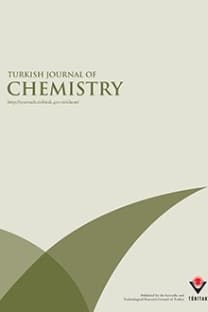Deactivation of a Co-Precipitated Co/Al2O3 Catalyst
Fischer-Tropsch synthesis, catalyst deactivation, cobalt-alumina catalysts, CO hydrogenation, co-precipitation
Deactivation of a Co-Precipitated Co/Al2O3 Catalyst
Fischer-Tropsch synthesis, catalyst deactivation, cobalt-alumina catalysts, CO hydrogenation, co-precipitation,
___
- P.M. Maitlis, J. Org. Chem. 689, 4366-4374 (2004).
- A.N. Akin and Z.˙I. ¨Onsan, React. Kinet. Catal. Lett. 70, 275-280 (2000).
- B. Jongsomjit, T. Wongsalee and P. Praserthdam, Catal Commun. 6, 705-710 (2005).
- A. Loaiza-Gil, B. Fontal, F. Rueda, J. Mendialdua and R. Casanova, Appl. Catal. A-Gen. 177, 193-203 (1999).
- K. Sapag, S. Rojas, M.L. Granados, J.L.G. Fierro and S. Mendioroz, J. Mol. Catal. A-Chem. 167, 81-89 (2001).
- G. Jacobs, P.M. Patterson, Y. Zhang, T. Das, J. Li and B.H. Davis, Appl. Catal. A- Gen. 233, 215-226 (2002).
- S. Storsaeter, Oφ Bo rg, E.A. Blekkan, B. To φdal and A. Holmen, Catal. Today, 100, 343-347 (2005).
- S.A. Hosseini, A. Taeb, F. Feyzi and F. Yaripour, Catal. Commun. 5, 137-143 (2004).
- F.M.T. Mendes, C.A.C. Perez, F.B. Noronha and M. Schmal, Catal. Today, 101, 45-50 (2005).
- R. Bechara, D. Balloy and D. Vanhove, Appl. Catal. A-Gen. 207, 343-353 (2001).
- A.N. Akin, A.E. Aksoylu and Z.˙I. ¨Onsan, React. Kinet. Catal. Lett. 66, 393-399 (1999).
- A.N. Akin and Z.˙I. ¨Onsan, J. Chem. Tech. Biotech. 69, 337-344 (1997).
- A.N. Akin and Z.˙I. ¨Onsan, J. Chem. Tech. Biotech. 70, 304-304 (1997).
- ISSN: 1300-0527
- Yayın Aralığı: 6
- Yayıncı: TÜBİTAK
Preparation and Morphological Characterization of a Catalytic Soot Oxidation SiC Foam Filter
Deactivation of a co-precipitated $Co/Al_2O_3$ catalyst
Meltem YILDIZ, Ayşe Nilgün AKIN
Characterization and CO Oxidation Activity Studies of Co-Based Catalysts
Low temperature CO oxidation kinetics over activated carbon supported $Pt-SnO_x$ catalysts
Ahmet Erhan AKSOYLU, Fatma Soyal BALTACIOĞLU, Berrin GÜLYÜZ, Zeynep İlsen ÖNSAN
Direct Formation of H2O2 from H2 and O2
Meltem YILDIZ, Ayşe Nilgün AKIN
Catalytic Processes for Clean Hydrogen Production from Hydrocarbons
Low Temperature CO Oxidation Kinetics over Activated Carbon Supported Pt-SnOx Catalysts
Fatma Soyal BALTACIOĞLU, Berrin GÜLYÜZ
Kinetics of Synthesis of Isobutyl Propionate over Amberlyst-15
Direct formation of $H_2O_2$ from $H_2$ and $O_2$
Meltem YILDIZ, Ayşe Nilgün AKIN
Investigation of Biodiesel Production from Canola Oil using Mg-Al Hydrotalcite Catalysts
